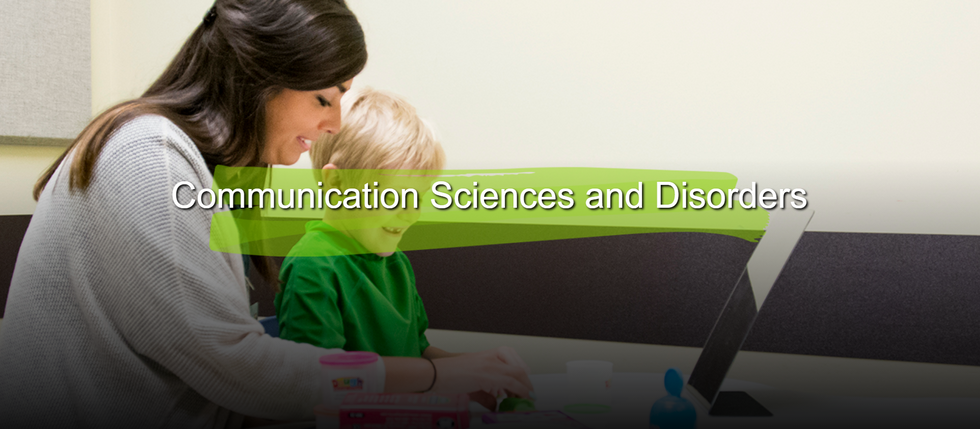Speech-Language Pathologists have arguably one of the most important jobs: helping people communicate. Communication is essential to everything we do and being able to do so properly is key to our jobs, education, and personal relationships. So why should you want to become an SLP? It's actually quite interesting!
1. You can work almost anywhere

SLPs can be dialect coaches in theatres (my dream job), speech therapists in schools, have their own practices, work with patients who have swallowing disorders in hospitals or teach nonverbal kids sign language to communicate. The opportunities are endless.
2. You can work with anyone

The great part about this job is that there is no limit to who you can treat. Clinicals purposely expose students to a variety of patients so they can gauge which populations they want to work with in the future. SLPs can help children with autism learn social skills and pick up on nonverbal social cues, work in nursing homes with elderly who have swallowing disorders, be a part of early intervention in children's specific language impairments, and more.
3. It's a fascinating field

There are so many different subfields to focus on in speech therapy: child language development, autism, speech disorders, articulation and phonology, improving accents, learning proper articulation and voicing in a new language, and more. They're not just confined to one field or space of work. Plus, if they don't want to treat patients, they can easily do research and contribute to new findings in their studies that clinicians will use in future practices.
4. Personal connections to patients

Speech therapists can develop close relationships to their patients from frequent sessions, working towards their established goals, and assessing their progress with each visit. It allows them to form a sense of cooperation, mutual respect and a sense of accomplishment when patients can notice their improvements after many sessions. It's a 1-on-1 kind of work, where the patient and provider are equally responsible for their actions to achieve success. Accountability is key.
5. It's a rewarding career

The great part of working so closely with people is that SLPs see their work pay off in front of their own eyes. It no doubt a confidence booster and a way to gradually assess their own practices, how they can improve in patientcare, then change up their methods of practice to suit their clients better. When actual physical procedures or medicine is involved, it's easier to see what works and what doesn't in between sessions without worrying about any severe consequences. Every healthcare professional wants to see improvements in their practices, so it's great to see those transformations up close and personal, as communication or talking for the affected individual becomes easier.
All five reasons above make me hyped to pursue SLP in graduate school and further my studies in Communication Sciences and Disorders. There is so much more to this field than I ever thought possible, and I cannot wait to see what this next year and a half in undergraduate studies has left to teach me! Here's to future SLP's!
- 5 Things I Learned While Studying To Become An SLP ›
- Strangely Enough, Thanks To My Brother's Speech Problems I ... ›
- 5 Misconceptions About Speech Pathologists ›



 women in street dancing
Photo by
women in street dancing
Photo by  man and woman standing in front of louver door
Photo by
man and woman standing in front of louver door
Photo by  man in black t-shirt holding coca cola bottle
Photo by
man in black t-shirt holding coca cola bottle
Photo by  red and white coca cola signage
Photo by
red and white coca cola signage
Photo by  man holding luggage photo
Photo by
man holding luggage photo
Photo by  topless boy in blue denim jeans riding red bicycle during daytime
Photo by
topless boy in blue denim jeans riding red bicycle during daytime
Photo by  trust spelled with wooden letter blocks on a table
Photo by
trust spelled with wooden letter blocks on a table
Photo by  Everyone is Welcome signage
Photo by
Everyone is Welcome signage
Photo by  man with cap and background with red and pink wall l
Photo by
man with cap and background with red and pink wall l
Photo by  difficult roads lead to beautiful destinations desk decor
Photo by
difficult roads lead to beautiful destinations desk decor
Photo by  photography of woman pointing her finger near an man
Photo by
photography of woman pointing her finger near an man
Photo by  closeup photography of woman smiling
Photo by
closeup photography of woman smiling
Photo by  a man doing a trick on a skateboard
Photo by
a man doing a trick on a skateboard
Photo by  two men
two men  running man on bridge
Photo by
running man on bridge
Photo by  orange white and black bag
Photo by
orange white and black bag
Photo by  girl sitting on gray rocks
Photo by
girl sitting on gray rocks
Photo by  assorted-color painted wall with painting materials
Photo by
assorted-color painted wall with painting materials
Photo by  three women sitting on brown wooden bench
Photo by
three women sitting on brown wooden bench
Photo by 
 Photo by
Photo by  Photo by
Photo by  Photo by
Photo by  Photo by
Photo by 


 people sitting on chair in front of computer
people sitting on chair in front of computer



 all stars lol GIF by Lifetime
all stars lol GIF by Lifetime two women talking while looking at laptop computerPhoto by
two women talking while looking at laptop computerPhoto by  shallow focus photography of two boys doing wacky facesPhoto by
shallow focus photography of two boys doing wacky facesPhoto by  happy birthday balloons with happy birthday textPhoto by
happy birthday balloons with happy birthday textPhoto by  itty-bitty living space." | The Genie shows Aladdin how… | Flickr
itty-bitty living space." | The Genie shows Aladdin how… | Flickr shallow focus photography of dog and catPhoto by
shallow focus photography of dog and catPhoto by  yellow Volkswagen van on roadPhoto by
yellow Volkswagen van on roadPhoto by  orange i have a crush on you neon light signagePhoto by
orange i have a crush on you neon light signagePhoto by  5 Tattoos Artist That Will Make You Want A Tattoo
5 Tattoos Artist That Will Make You Want A Tattoo woman biting pencil while sitting on chair in front of computer during daytimePhoto by
woman biting pencil while sitting on chair in front of computer during daytimePhoto by  a scrabbled wooden block spelling the word prizePhoto by
a scrabbled wooden block spelling the word prizePhoto by 
 StableDiffusion
StableDiffusion
 StableDiffusion
StableDiffusion
 StableDiffusion
StableDiffusion









